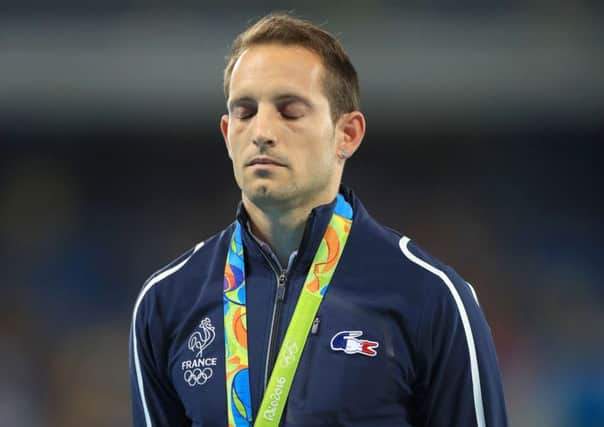Rio crowd disgraces itself with shameful podium booing


Lavillenie, the London 2012 champion who had lost out in Monday night’s titanic tussle with local hero Thiago Da Silva, was reduced to tears on the podium after the appalling reaction from the Brazilian crowd.
Da Silva, who had delivered a thrilling surprise win in the competition with an Olympic record, was shocked and gestured with his arms in a vain attempt to quieten the boos that rang around the half-empty stadium.
Advertisement
Hide AdAdvertisement
Hide AdInternational Olympic Committee president Thomas Bach later said via the IOC Media’s Twitter feed: “Shocking behaviour for the crowd to boo Renaud Lavillenie on the medal podium. Unacceptable at the Olympics.”
Athletics legend Michael Johnson was clearly incensed by the behaviour of the crowd and expressed his disgust in his role as a pundit on BBC.
“That is just wrong,” said Paula Radcliffe, another member of the BBC’s athletics team, on Twitter. “Ashamed of the track and field crowd tonight. Cheer your own as loud as you like but never disrespect the others.”
The 22-year-old Brazilian beat the defending champion in a thrilling contest, but it was marred by large sections of the crowd booing Lavillenie’s attempts.
The hostile atmosphere clearly unsettled the Frenchman, who gave fans the thumbs-down sign between attempts and in his first interview after the event and likened his treatment to the reception America’s black sprinter Jesse Owens received at the 1936 Olympics in Germany.
He apologised for that comment in the press conference later on but repeated his belief that booing rivals was unacceptable at the Olympics.
He said: “If you get no respect in the Olympics, where can you get respect?”
The behaviour of the crowds in the venues - when there are crowds in the venues - has been a recurring theme during the Games, with athletes, coaches and officials frequently having to ask for quiet at key times.
Advertisement
Hide AdAdvertisement
Hide AdBut the Brazilian fans’ football-style bonhomie has also created a great atmosphere in some venues, particularly when a home athlete or team were in action, or Argentina were playing.
But Mario Andrada, the spokesman for Rio 2016’s organising committee, admitted that his compatriots went too far in the pole vault final.
“As an organising committee, and as a citizen of Brazil and a sports fan, we don’t think booing is the right attitude, even when you’re in one-to-one competition with a young Brazilian who has a chance to be the champion,” said Andrada.
“We plan to intensify our dialogue with the Brazilian fans through social networks to make sure that they behave as fans in the proper and elegant manner without losing the passion for sport.
“Booing is not the right thing to do when you are competing at Olympic level.”
The International Olympic Committee has largely avoided saying anything critical about Rio, Rio 2016’s organisers or Brazilians fans, but its spokesman Mark Adams did say Olympic bosses would prefer it if “the passion is channelled in a good way”.
But on the continuing problem of Rio’s half-empty venues, which was glaringly obvious during Monday’s memorable night of athletics, neither Adams nor Andrada had any new answers.
The latter repeated his mantra that ticket sales have improved as the Games have gone on, with the apparent gaps in the crowd being a product of fans not showing up for the actual sport, only staying for some part of the long sessions and leaving venues to look for refreshments.
Advertisement
Hide AdAdvertisement
Hide AdAndrada admitted that 400,000 tickets were still available but said they were giving away an extra 25,000 to local school children.
However, he said the organising committee would not cut the cost of the remaining tickets as it was a private company determined to deliver the Games without public subsidy and therefore needed the ticket revenues.